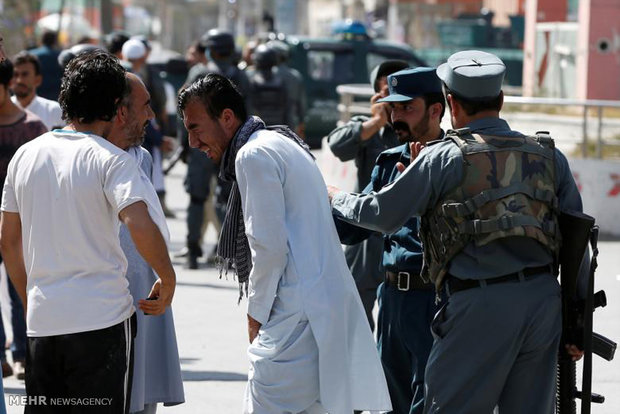The recent massacre of civilians in the village of Mirza Olang, Sar-e Pul province of Afghanistan by terrorist groups is unprecedented in the recent years of armed conflicts in Afghanistan which has remain plagued by militancy despite the presence of foreign troops.
Local organizations and governmental officials have confirmed the massacre, which is a war crime and may amount to a crime against humanity.
According to the eyewitnesses, the systematic killing of approximately 52 civilians, including women and children, individually and en masse, without any distinction.
Hundreds of families have lost their houses and properties and are displaced. Displaced families are deprived of their fundamental facilities including access to clean water, food and shelter and they urgently require assistance from the Government, national and international humanitarian organizations.
The targeted mass killing of civilians, including women and children, without distinction and the destruction without military necessity and pillage of civilian property are crimes that go against human values. They are violations of international human rights law and international humanitarian law, specifically Common Article 3 of the Geneva Conventions 1949 and Article 8 of the Rome Statute of the International Criminal Court 1998.
The Transitional Justice Coordination Group (TJCG) condemns the commission of war crimes in the village of Mirza Olang, Sur-e Pul province in the strongest possible terms.
According to Fidh.org, TJCG believes that the reason behind the commission and repetition of such egregious crimes in the country is the lack of ability of the Afghanistan to provide security for its citizens, especially for ethnic and religious minorities.
Taliban militants who were removed from power following the 2001 US-led invasion of Afghanistan, but they have stepped up activities in recent months, attempting to overrun several regions. During the past 16 years, the militants have been conducting terrorist attacks across the country, killing and displacing civilians.
Afghan President Ashraf Ghani condemned the massacre, saying, “This barbaric act of them (militants) is deemed a direct violation of human rights and a war crime.”
“Criminal terrorists have once again killed civilians, women and children in Sayad district of Sar-e Pul Province, adding to their crimes,” said the president.
War Crime
An investigation team of the United Nations has confirmed that the Taliban and Daesh terrorist groups jointly massacred dozens of people, mostly Shia Hazaras, in an attack that “may amount to a war crime” in a remote northern village in Afghanistan earlier this month.
Investigators of the UN Assistance Mission in Afghanistan (UNAMA) said in a fact-finding report published that they had “verified allegations” of at least 36 deaths in the Shia-majority village of Mirza Olang.
“These killings, corroborated by multiple credible sources, constitute violations of international humanitarian law and may amount to war crimes,” UNAMA said in its report.
Baseless Allegations:
Meanwhile, Taliban has rejected the UN report, claiming that it contained “baseless allegations” and “false claims.”
However, Daesh has recently announced that it had killed some 54 Shia Muslims in the ill-fated village.
Retaking Mirza Olang
Following the tragic incident, Afghan army announced that it launched an operation to retake Miza Olang village.
On August 14, Afghan forces managed to recaptured the village, just over a week after it fell to militants.
Mirza Olang residents said they have so far recovered 42 bodies from the area including the bodies of three children who were beheaded.
According to residents, the majority of those buried in these graves were civilians and some of them members of the public uprising forces but the bodies of three children, who were beheaded, were also recovered.
Iran’s Denunciation:
Ali Shamkhani the Secretary of Supreme National Security Council (SNSC) slammed terrorist attacks on innocent people in Mirza Olang village in a message to his Afghan counterpart and condoled people and government of Afghanistan over the sad occasion.
'Such distressing measures which have been originated from Takfiri and extremist ideologies will only end by firm decision and cooperation of the neighboring countries as well as a real fight against terrorism,' Shamkhani said.
Iran spares no efforts in achieving collective security and restoring stability in the countries affected by terrorism, he stressed.
Touching upon the horrendous terrorist attack in Mirza Olang village in Afghanistan, Head of the Strategic Research Center of the Expediency Council Ali Akbar Velayati urged international community to put an end to brutal terrorist acts in the world.
Again a tragedy by Taleban and Daesh terrorists who even behead kids, start manslaughter, shoot people dead in groups and bring about displacement and bondage, happened in silences of international bodies and the so-called human rights institutions and some western countries claiming to fight terrorism and extremism, Velayati said.
He pointed to Islamic Republic of Iran policies in fighting terrorism, saying Iran slams terrorism in any shape and in any place such as Afghanistan, Iraq, Syria, Paris, Berlin and London as well, PressTV wrote.
Afghanistan is still grappling with violence well over a decade after the US and its allies invaded the country as part of the so-called war on terror. The invasion removed the Taliban from power, but has failed to stop the militancy.
Taking advantage of the chaos, the Daesh terror group, which is mainly based in the Middle East, has managed to establish a foothold in the eastern Province of Nangarhar.
Hundreds of people, including women and children, have fled the recent wave of violence fueled by Daesh terrorists in Nangarhar to take refuge in the provincial capital Jalalabad.
Some 1,500 internally-displaced people have gathered in an unfinished university building on the outskirts of Jalalabad.
Undoubtedly the negligence of security departments, failure to prosecute the crimes committed by terrorist groups and the lack of serious steps for providing security for civilians, especially for ethnic and religious minorities, is of grave concern in Afghanistan.
Taking advantage of the chaos, the Daesh Takfiri group, which is mainly based in the Middle East, has managed to establish some footholds in Afghanistan, trying to recruit from Afghan Taliban defectors.
























Your Comment